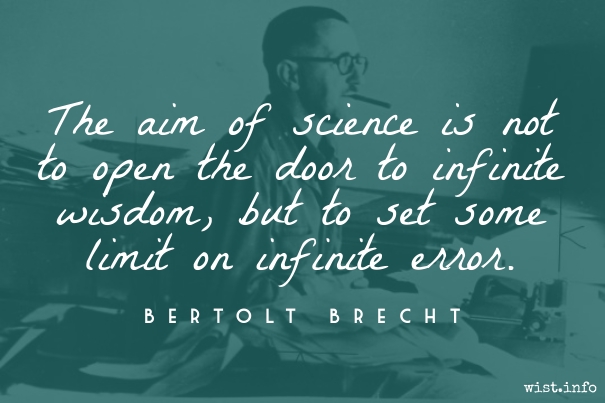Quotations by:
Brecht, Bertholt
General, your tank
is a powerful vehicle
it smashes down forests
and crushes a hundred men.
but it has one defect:
it needs a driver.
He who laughs
Has not yet received
The terrible news.[Der Lachende
Hat die furchtbare Nachricht
Nur noch nicht empfangen.]Bertolt Brecht (1898-1956) German poet, playwright, director, dramaturgist
“To Those Born Later [An die Nachgeborenen],” (1938) [tr. Horton (2008)]
(Source)
Alt. trans.: "He who laughs last has not yet heard the bad news," and "The man who laughs has simply not yet had the terrible news."
The title is also sometimes translated as "To Those Who Follow In Our Wake" and "To Those Born After."
Oddly enough, the German is sometimes given in paraphrase (or back-translated from the English): "Wer jetzt noch lacht, hat die neuesten Nachrichten noch nicht gehört." This German only appears to be found on quotation sites.
When evil-doing comes like falling rain, nobody calls out “stop!”
When crimes begin to pile up they become invisible.
When sufferings become unendurable the cries are no longer heard.
The cries, too, fall like rain in summer.
MACHEATH: You may proclaim, good sirs, your fine philosophy
But till you feed us, right and wrong can wait![Erst kommt das Fressen, dann kommt die Moral.]
Bertolt Brecht (1898-1956) German poet, playwright, director, dramaturgist
Die Dreigroschenoper [The Three-Penny Opera], Act 2, sc. 3 (1928)
Alt. trans.:
- However much you twist, whatever lies you tell / Food is the first thing, morals follow on." [used by the Pet Shop Boys, "What Keeps Mankind Alive?", Can You Forgive Her (1993)
- Food first, then morality.
- Food comes first, then morals.
- First comes a full stomach, then comes ethics.
POLLY PEACHUM: The law is simply and solely made for the exploitation of those who do not understand it or of those who, for naked need, cannot obey it.
Oh the shark has pretty teeth, dear,
And he shows them pearly white.
Just a jack-knife has MacHeath, dea,r
And he keeps it out of sight.[Und der Haifisch, der had Zähne
Und die trägt er im Gesicht
Und MacHeath, der had ein Messer
Doch das Messer sieht man nicht.]Bertolt Brecht (1898-1956) German poet, playwright, director, dramaturgist
Die Dreigroschenoper [The Three-Penny Opera], Prologue, “The Ballad of Mackie the Knife” (1928)
English lyrics to "The Ballad of Mack the Knife" (Weill, Kurt / Berthold Brecht / Marc Blitzstein)
Alt: translation: "And the shark he has his teeth and / There they are for all to see / And MacHeath he has his knife but / No one knows where it may be."
ANDREA: Unhappy the land that has no heroes! …
GALILEO: No, Unhappy the land that needs heroes.[ANDREA: Unglücklich das Land, das keine Helden hat! …
GALILEO: Nein, Unglücklich das Land, das Helden nötig hat.]
If we could learn to look, instead of gawking,
We’d see the horror in the heart of farce.
If only we could act, instead of talking,
We wouldn’t always end up on our arse.
This is the thing that nearly had us mastered;
Don’t yet rejoice in his defeat, you men!
Although the world has stood up and stopped the bastard,
The bitch that bore him is in heat again.[Ihr aber lernet, wie man sieht statt stiert
Und handelt, statt zu reden noch und noch.
So was hätt einmal fast die Welt regiert!
Die Völker wurden seiner Herr, jedoch
Dass keiner uns zu früh da triumphiert —
Der Schoß ist fruchtbar noch, aus dem das kroch.]Bertolt Brecht (1898-1956) German poet, playwright, director, dramaturgist
The Resistible Rise of Arturo Ui [Der Aufhaltsame Aufstieg des Arturo Ui], Epilogue (1941) [tr. Tabori (1963)]
(Source)
Original German. The end of the play, after the violent death of the gangster Ui, modeled after the rise of Hitler. It was not performed until 1958 (German), 1960 (English). The above is the translation first used on Broadway (1963).
The last three lines are in the credits of the Sam Peckinpah (dir.) film Cross of Iron (1977).
Alternate translations:
Therefore we learn how to see and not to gape.
To act instead of talking all day long.
The world was almost won by such an ape!
The nations put him where his kind belong.
But don't rejoice too soon at your escape --
The womb he crawled from is still going strong.
[tr. Manheim (1981)]
The last four lines of Manheim's version were quoted by a vampire in the final episode of the first series (UK) of Being Human (2008).
Learn how to face the facts you tried to shun.
And how to act, where once you idly slept.
That's how the world was going to be run!
The nations duly mastered it, except
(In case you think the battle has been won) --
The womb is fertile still from which that crept.
[tr. Willett]
That was similar to the quatrain Willett translated (1998) from the portion of that that Brecht used in his War Primer [Kriegsfibel] (1947):
That’s how the world was going to be run!
The other nations mastered him, except
(In case you think the battle has been won) --
The womb is fertile still from which that crept.
Something like that almost governed the world.
Yet the people mastered him. But
I wish you'd hold your triumph:
The womb is fertile still from which that crawled.
[Another Kriegsfibel trans.]
Let none of us exult too soon: the womb is fertile still from which this monster crawled.
[Notes from Brecht in the notes for José Limón's unfinished memoir]
Do not applaud quite so soon, for the womb is fertile still from where this one crawled.
[Source]


